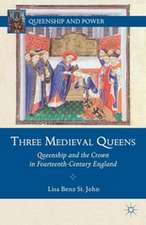The Theory and Practice of Revolt in Medieval England
Autor Claire Valenteen Limba Engleză Hardback – 4 mar 2003
Preț: 765.84 lei
Preț vechi: 1028.36 lei
-26% Nou
Puncte Express: 1149
Preț estimativ în valută:
146.56€ • 151.41$ • 121.98£
146.56€ • 151.41$ • 121.98£
Carte tipărită la comandă
Livrare economică 26 martie-09 aprilie
Preluare comenzi: 021 569.72.76
Specificații
ISBN-13: 9780754609018
ISBN-10: 0754609014
Pagini: 288
Dimensiuni: 156 x 234 x 24 mm
Greutate: 0.54 kg
Ediția:1
Editura: Taylor & Francis
Colecția Routledge
Locul publicării:Oxford, United Kingdom
ISBN-10: 0754609014
Pagini: 288
Dimensiuni: 156 x 234 x 24 mm
Greutate: 0.54 kg
Ediția:1
Editura: Taylor & Francis
Colecția Routledge
Locul publicării:Oxford, United Kingdom
Cuprins
Contents: Preface; Why study revolt? Theories of resistance 1215-1399; Prelude: 1215-1217, the crisis of Magna Carta; 1258-1265, the community of the Realm; Interlude: 1297-1301, successful reform; 1308-1327, transitions; Interlude: Edward III, the Peasants' Revolt; 1386-1399, personal agendas; Postlude: 1400-1415, Fragmentation and dynastic revolt; Conclusions; Appendix; Bibliography; Index.
Recenzii
'Recommended. Upper-division undergraduates and above.' Choice Reviews 'Valente is to be congratulated for having written an important study that puts basic questions of medieval English kingship, magnate opposition, and political society into the spotlight of analysis... The book deserves attention because it is a thoughtful scholarly enterprise along lines that are at once highly significant and radically unfashionable.' Speculum '... shows a mastery of archival sources from the period and presents a convincing and thought-provoking narrative of the evolution of revolt.' The Medieval Review 'Valente offers a thoughtful analysis of an important aspect of political life, and her book should be of considerable interest to students and scholars.' Albion '... offers [..] a rich understanding of the dynamics and political structures of late medieval England and provides a nuanced reading of the interrelation of change, reform, resistance and personality which can only enhance our interpretation of the development of English government.' Parergon 'In her well-written and well-researched recent work, Valente challenges traditional ideas concerning the reasons behind baronial resistance between the years 1215 and 1415, and concludes that the nature of rebellion changed over the centuries in accordance with previously addressed grievances' becoming common rights... This book is an excellent resource for academic libraries and researchers with specific interests. It clearly provides the more advanced student of medieval English history with an evolutionary understanding of the working relationship between barons and kings.' Sixteenth Century Journal
Descriere
Medieval Englishmen were treacherous, rebellious and killed their kings, as their French contemporaries repeatedly noted. In the 13th through 15th centuries, ten kings faced serious rebellion, in which eight were captured, deposed, and/or murdered. The author takes a comparative look at these crises, seeking to understand medieval ideas of proper kingship and government, the role of political violence and the changing nature of reform initiatives and the rebellions to which they led. This study attempts to understand medieval beliefs on their own terms rather than with regard to modern assumptions. It argues that rebellion was an accepted and to a certain extent legitimate means to restore good kingship throughout the period, but that over time it became increasingly divorced from reform aims, which were satisfied by other means, and transformed by growing lordly dominance, arrogance, and selfishness. Eventually the tradition of legitimate revolt disappeared, to be replaced by both parliament and dynastic civil war.












